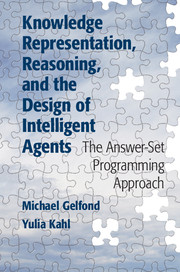 Knowledge Representation, Reasoning, and the Design of Intelligent Agents
Knowledge Representation, Reasoning, and the Design of Intelligent Agents Book contents
- Frontmatter
- Dedication
- Contents
- Preface
- 1 Logic-Based Approach to Agent Design
- 2 Answer Set Prolog (ASP)
- 3 Roots of Answer Set Prolog
- 4 Creating a Knowledge Base
- 5 Representing Defaults
- 6 The Answer-Set Programming Paradigm
- 7 Algorithms for Computing Answer Sets
- 8 Modeling Dynamic Domains
- 9 Planning Agents
- 10 Diagnostic Agents
- 11 Probabilistic Reasoning
- 12 The Prolog Programming Language
- Appendix A ASP Solver Quick-Start
- Appendix B Aspide
- Appendix C Introduction to SPARC
- Appendix D Code
- Bibliography
- Index
8 - Modeling Dynamic Domains
Published online by Cambridge University Press: 05 July 2014
- Frontmatter
- Dedication
- Contents
- Preface
- 1 Logic-Based Approach to Agent Design
- 2 Answer Set Prolog (ASP)
- 3 Roots of Answer Set Prolog
- 4 Creating a Knowledge Base
- 5 Representing Defaults
- 6 The Answer-Set Programming Paradigm
- 7 Algorithms for Computing Answer Sets
- 8 Modeling Dynamic Domains
- 9 Planning Agents
- 10 Diagnostic Agents
- 11 Probabilistic Reasoning
- 12 The Prolog Programming Language
- Appendix A ASP Solver Quick-Start
- Appendix B Aspide
- Appendix C Introduction to SPARC
- Appendix D Code
- Bibliography
- Index
Summary
So far, we have limited our attention to static domains — no attempt was made to represent a domain's evolution in time. Recall from the introduction that we are interested in agents that are intended to populate dynamic, changing domains and should therefore be able to plan, explain unexpected observations, and do other types of reasoning requiring the ability to predict effects of series of complex actions. This can be done only if the agent has sufficient knowledge about actions and their effects. In this chapter we discuss one of several current approaches to representing and reasoning with such knowledge. We start by looking at an extended example that illustrates some of the issues that arise when we attempt to represent actions and their effects on the world. Once some of these issues become clear, we present a general, formal theory of actions and change, with further examples on how to apply it to various domains. The theory views the world as a dynamic system whose states are changed by actions, and provides an “action language” for describing such systems. This language allows concise and mathematically accurate descriptions of the system's states and of possible state-action-state transitions; it allows us to represent dynamic domains and their laws. Such representations can be translated into ASP programs that are used to give the precise semantics of the language. Later, we show how this and similar translations can be used to answer queries about the effects of actions in a given situation.
- Type
- Chapter
- Information
- Knowledge Representation, Reasoning, and the Design of Intelligent AgentsThe Answer-Set Programming Approach, pp. 152 - 191Publisher: Cambridge University PressPrint publication year: 2014


